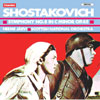Shostakovich Symphony 8
View record and artist detailsRecord and Artist Details
Composer or Director: Dmitri Shostakovich
Label: Chandos
Magazine Review Date: 4/1990
Media Format: CD or Download
Media Runtime: 64
Mastering:
DDD
Catalogue Number: CHAN8757

Tracks:
| Composition | Artist Credit |
|---|---|
| Symphony No. 8 |
Dmitri Shostakovich, Composer
Dmitri Shostakovich, Composer Neeme Järvi, Conductor Royal Scottish National Orchestra |
Composer or Director: Dmitri Shostakovich
Label: Chandos
Magazine Review Date: 4/1990
Media Format: Cassette
Media Runtime: 0
Mastering:
DDD
Catalogue Number: ABTD1396

Tracks:
| Composition | Artist Credit |
|---|---|
| Symphony No. 8 |
Dmitri Shostakovich, Composer
Dmitri Shostakovich, Composer Neeme Järvi, Conductor Royal Scottish National Orchestra |
Composer or Director: Dmitri Shostakovich
Label: Red Seal
Magazine Review Date: 4/1990
Media Format: Cassette
Media Runtime: 0
Mastering:
DDD
Catalogue Number: RK60145

Tracks:
| Composition | Artist Credit |
|---|---|
| Symphony No. 8 |
Dmitri Shostakovich, Composer
Dmitri Shostakovich, Composer Leonard Slatkin, Conductor St Louis Symphony Orchestra |
Composer or Director: Dmitri Shostakovich
Label: Red Seal
Magazine Review Date: 4/1990
Media Format: CD or Download
Media Runtime: 62
Mastering:
DDD
Catalogue Number: RD60145

Tracks:
| Composition | Artist Credit |
|---|---|
| Symphony No. 8 |
Dmitri Shostakovich, Composer
Dmitri Shostakovich, Composer Leonard Slatkin, Conductor St Louis Symphony Orchestra |
Composer or Director: Dmitri Shostakovich
Label: Chandos
Magazine Review Date: 4/1990
Media Format: Vinyl
Media Runtime: 0
Mastering:
DDD
Catalogue Number: ABRD1396

Tracks:
| Composition | Artist Credit |
|---|---|
| Symphony No. 8 |
Dmitri Shostakovich, Composer
Dmitri Shostakovich, Composer Neeme Järvi, Conductor Royal Scottish National Orchestra |
Author: Michael Oliver
So far so good, though I was worried by Jarvi's failure to do very much with those violin passages m the opening movement that Shostakovich asked to be given the paler, thinner colouring that comes from playing with the bow close to the finger-board. This under-characterization, however, seems to me much more serious in the passacaglia, where the composer's repeated demands for expressive playing (at one point he writes espress. three times in six bars) disturb Jarvi's earnest sobriety hardly a jot. Subdued poignancy is certainly an option in this music (Haitink chooses it, and the result is moving) but Jarvi gets close to impassivity, and the sudden pang that should strike in the coda fails to do so. His account of the finale is perplexing: greyish, rather mechanistic in the faster pages and again almost dispassionate. Numb, even, and perhaps that is his intention, but there is a world of uneasy emotion in this music that his reading seems to turn away from.
Slatkin's account is carefully balanced, well played and thoughtfully paced: praiseworthy virtues, but hardly exciting ones, and indeed his passacaglia is not so much sober as dull, his account of that first savage scherzo approaches geniality in its impactless refusal to play a true staccato. Gently expressive pages go well; those needing eloquence, feverishness or urgency are under-stated. A brightish sound again, but this time it is the recording, which adds a touch of sourness to the high strings (and the side drum, irritatingly enough, is wheeled forward into the midst of the violins at one point in the first movement). Rozhdestvensky's much more vehement reading on Olympia/Conifer is let down by a shriller recording still, so it remains a choice between Mravinsky (burningly eloquent, with appalling power) and Haitink (more nobly restrained, and superlatively played and recorded).'
Discover the world's largest classical music catalogue with Presto Music.

Gramophone Digital Club
- Digital Edition
- Digital Archive
- Reviews Database
- Full website access
From £8.75 / month
Subscribe
Gramophone Full Club
- Print Edition
- Digital Edition
- Digital Archive
- Reviews Database
- Full website access
From £11.00 / month
Subscribe
If you are a library, university or other organisation that would be interested in an institutional subscription to Gramophone please click here for further information.





